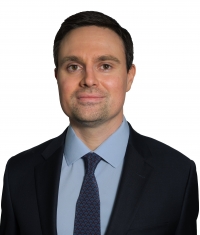
Stephen Anstey is an attorney and member of Kilpatrick Townsend’s Energy, Fintech, and Native American Affairs teams as well the Firm’s Government & Regulatory and Blockchain Technology & Digital Currency practices. Stephen also founded and leads the Kilpatrick Townsend Digital Assets Regulation Blog.
I recently had the pleasure of talking to Stephen in an inspired and inspirational JD Supra Office Hours Zoom session focused on how attorneys can leverage the power of content marketing.
I highly recommend listening to the full 45-minute recording (details below) to hear about Stephen’s approach to topic selection, how he works with his firm and communications team, his thoughts on LinkedIn and YouTube, and more. For now, I’ve captured a few pertinent takeaways to whet your appetite:
Focus on Your Interests (and Your Audiences):
“You should write what you find interesting. And I find digital assets interesting. At the time I found Covid relief interesting. But if you can’t find something that you find interesting, write about what other people find interesting.”
Stephen’s writing portfolio includes a mix of Covid-era topics like Coronavirus State and Local Fiscal Recovery Funds and Restaurant Revitalization Fund, but more recently he shifted toward Cryptocurrency.
Stephen identified a need in the Digital Assets space (primarily concerning cryptocurrencies, stablecoins, tokenization, and central bank digital currencies), “There was a lack of clear and non-hyperbolic writing on digital assets.”
Stephen is clearly meeting the need, making the Most Popular list five months over the last year and now trending on the topic of Cryptocurrency. In addition to relatively short pieces explaining digital assets, Stephen authors more detailed pieces that can be reused. His portfolio is a mix of styles depending on the format and need of the audience.
Find the Opportunity:
A question from the audience which I often field, “How often do you write?”
Stephen’s answer: “What might be more important than doing a lot of content is being timely and that is really tough in a law firm because we are all really busy. We don’t write the news and you have to go through systems. I think it’s about being timely and I think it’s about knowing your audience. Whatever you are writing in, what is of interest to them? What information aren’t they getting from really great publications?”
I understood this to mean: think niche. A topic that matters to in-house counsel and executives might be too narrow to warrant coverage from a typical national or international business publication. This gives you the opportunity to take up the story where mainstream media leave off, and then fill that gap.
Experiment with Format:
One of my favorite takeaways from Stephen is evident in his body of work: try new things, including video.
“I cause tremendous mischief in my own law firm. I was just trying things. I know the content area, I’ve written about it already so maybe there is an audience who want to have me talk about it.”
In addition to reading Stephen’s posts, I recommend watching his videos to get a sense for his quick improvements. “It’s incredibly important to have the basic hardware to do good videos and to do good Zoom meetings. It’s not expensive. The benefit for a Zoom call of having good speakers, good audio and looking like you did this on purpose is less expensive than a good suit. It really is one of those things that is a very small investment that gives you absolutely massive returns: learning the basics of audio and video recording for legal work.”
Leverage Your Support Network:
In the midst of Covid, Stephen identified a need to inform others about Government programs: “I talked to my communications team and asked how does this work? How do we get information out quickly to people who need to know this?”
Kilpatrick Townsend’s Communications Team responded with the information and support to distribute the content beyond Stephen’s existing network to reach people who’d expressed an interest in those topics. “I think something that’s important to stress here is that I didn’t do this in a vacuum. I had the ability to write the materials, I’m pretty good at making this very complex topic palatable and digestible and that’s what I tried to do. But it was my firm who taught me how to take the writing and make it broadly applicable and fun to read and interactive and to do well and that was a whole other learning experience that happened after I started writing.”
Let Data Guide You:
"My communications team figured out that my writing was popular before I did." With support from his communications team, Stephen now utilizes his analytics to review popular content within his portfolio and apply that knowledge to future posts. Recognizing that sometimes content that takes an afternoon to write outperforms content that took up an entire weekend. "I am trying to learn what hits people. It is a constantly evolving process."
In addition to many other digestible takeaways, in the full recording Stephen addresses the importance of LinkedIn, YouTube, other content creators and creating and using systems .
*
It was an invaluable session and I thank Stephen for being so generous with his time and insights. If you'd like to watch and listen to the entire Zoom recording, drop me a note and I'll happily provide the link!
- Paul Ryplewski, VP Client Services
